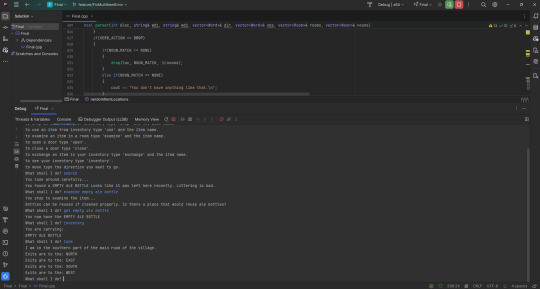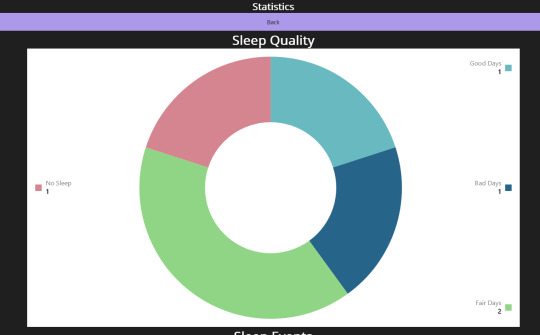#C Programming Course
Explore tagged Tumblr posts
Text
Advanced C Programming: Mastering the Language
Introduction
Advanced C programming is essential for developers looking to deepen their understanding of the language and tackle complex programming challenges. While the basics of C provide a solid foundation, mastering advanced concepts can significantly enhance your ability to write efficient, high-performance code.
1. Overview of Advanced C Programming
Advanced C programming builds on the fundamentals, introducing concepts that enhance efficiency, performance, and code organization. This stage of learning empowers programmers to write more sophisticated applications and prepares them for roles that demand a high level of proficiency in C.
2. Pointers and Memory Management
Mastering pointers and dynamic memory management is crucial for advanced C programming, as they allow for efficient use of resources. Pointers enable direct access to memory locations, which is essential for tasks such as dynamic array allocation and manipulating data structures. Understanding how to allocate, reallocate, and free memory using functions like malloc, calloc, realloc, and free can help avoid memory leaks and ensure optimal resource management.
3. Data Structures in C
Understanding advanced data structures, such as linked lists, trees, and hash tables, is key to optimizing algorithms and managing data effectively. These structures allow developers to store and manipulate data in ways that improve performance and scalability. For example, linked lists provide flexibility in data storage, while binary trees enable efficient searching and sorting operations.
4. File Handling Techniques
Advanced file handling techniques enable developers to manipulate data efficiently, allowing for the creation of robust applications that interact with the file system. Mastering functions like fopen, fread, fwrite, and fclose helps you read from and write to files, handle binary data, and manage different file modes. Understanding error handling during file operations is also critical for building resilient applications.
5. Multithreading and Concurrency
Implementing multithreading and managing concurrency are essential skills for developing high-performance applications in C. Utilizing libraries such as POSIX threads (pthreads) allows you to create and manage multiple threads within a single process. This capability can significantly enhance the performance of I/O-bound or CPU-bound applications by enabling parallel processing.
6. Advanced C Standard Library Functions
Leveraging advanced functions from the C Standard Library can simplify complex tasks and improve code efficiency. Functions for string manipulation, mathematical computations, and memory management are just a few examples. Familiarizing yourself with these functions not only saves time but also helps you write cleaner, more efficient code.
7. Debugging and Optimization Techniques
Effective debugging and optimization techniques are critical for refining code and enhancing performance in advanced C programming. Tools like GDB (GNU Debugger) help track down bugs and analyze program behavior. Additionally, understanding compiler optimizations and using profiling tools can identify bottlenecks in your code, leading to improved performance.
8. Best Practices in Advanced C Programming
Following best practices in coding and project organization helps maintain readability and manageability of complex C programs. This includes using consistent naming conventions, modularizing code through functions and header files, and documenting your code thoroughly. Such practices not only make your code easier to understand but also facilitate collaboration with other developers.
9. Conclusion
By exploring advanced C programming concepts, developers can elevate their skills and create more efficient, powerful, and scalable applications. Mastering these topics not only enhances your technical capabilities but also opens doors to advanced roles in software development, systems programming, and beyond. Embrace the challenge of advanced C programming, and take your coding skills to new heights!
#C programming#C programming course#Learn C programming#C programming for beginners#Online C programming course#C programming tutorial#Best C programming course#C programming certification#Advanced C programming#C programming exercises#C programming examples#C programming projects#Free C programming course#C programming for kids#C programming challenges#C programming course online free#C programming books#C programming guide#Best C programming tutorials#C programming online classes
2 notes
·
View notes
Text
Learn Best C Programming Language Courses
C Language is one of the most basic or beginner C Programming Languages Course, C Language has had a direct bearing on most of the programming languages that have evolved out of it, and one must at least have an understanding of what is C Language in order to be able to boss any language around. As getting complete knowledge of programming languages is very crucial and essential to enter the world of development which is considered to be the most competitive ad prestigious profession and high paying job in today’s world. So to begin the journey of learning C, you can do so with some of the best courses.
Takeoff upskill today we are going to discuss the 10 Best C Programming Courses for Beginners: these are the best courses offering you good content for learning and at the meantime issued a certificate after completion of the course. To summarize, let’s consider each of them in detail, and perhaps you will decide which method is more suitable for you.
Takeoff upskill should first read some of the C programming language information before explaining the best courses to take for C programming.

Introduction to C Programming:
An overview of C language and where it fits.
Environmental planning (IDEs- for instance VS Code, Dev-C++, etc.).
The bare structure of a C program includes the following categories:
The first process that you need to go through when writing a “Hello World” program involves writing your first program and compiling it.
Variables and Data Types:
Knowledge regarding the different variable types that are available like integers, floating-point numbers, character, etc.
Declaring and initializing variables.
Basic arithmetic operations.
Control Flow:
Conditional statements (if-else, switch-case).
Control of experiments through looping structures such as for, while, do while.
Annotation of code using breaks and continues.
Functions:
Functions and their significance for calculating regularities.
Function declaration and definition.
Passing arguments to functions.
Returning values from functions.
Arrays and Strings:
Declaring and initializing arrays.
Accessing array elements.
Input-output (printf, scan, etc.), string manipulations (strcpy, strcat, strlen, etc.)
Multi-dimensional arrays.
Pointers:
What pointers are, why there are used, and how they and memory addresses?
Pointer arithmetic.
Pointers and arrays.
Malloc, calloc, realloc for dynamic memory allocation and free to free the memory space allocated dynamically.
Structures and Unions:
Defining and using structures.
Accessing structure members.
Nested structures.
Introduction to unions.
File Handling:
Reading and writing files from C (structuring, opening, accessing and closing).
Position(s) of the file (open, read-only, write-only or append)
Different methods, which should be implemented for error handling while processing the files.
Preprocessor Directives:
Significantly, one of the areas that most students face great trouble in is tackling pre-processor directives (#define, #include, #ifdef, etc.)
Taking advantage of macros throughout the program’s code to reduce code redundancy and increase signal-to-clutter ratio, thus improving code readability and maintainability.
Advanced Topics:
Recursion.
Enumerations.
Typedef.
Bitwise operations.
Command line arguments.
Best Practices and Tips:
Coding conventions and standards.
Debugging techniques.
Memory management practices.
Performance optimization tips.
Projects and Exercises:
Giving out a few Specific tasks and activities that come under the topic in question so as to ensure that the knowledge imparted is put into practice.
So if you’re looking for a project that will allow you to use C programming, the following are some suggestions to consider.
CONCLUSION:
All of these topics can be developed into full-scale articles, with various examples and subtopics further elaborated with actual code snippets and describes. To encourage the reader, they can also include quizzes or coding challenges at the end of each section for the reader to solve before moving to the next section. However, using the samples for download and the exercises which are usually included in the lessons make the lessons more effective.
#C Programming Language#C Programming course#Online & Offline course#IT & Software Course#Software course
0 notes
Text
Learn Best C Programming Language Courses
C Language is one of the simplest or entry-level C Programming Language Courses, C Language has caused a direct impact on most of the C Programming Languages that have been derived from it and it is a fact that if you have to at least have some idea of what is C Language in order to at least tell off any language.
Hence, it is a very important must for getting complete knowledge of programming languages so that it may easily enter the world of development which is one of the most competitive and prestigious professions and highly paid jobs of the modern world. Therefore, if you want to start the process and learn the basics of C, you are welcome to start with some of the courses listed above.

Takeoff upskill Today we are going to discuss the 10 Best C Programming Courses for Beginners: these are some of the best to choose from; they provide you with good content for learning and at the same time when you complete the course you are awarded with a certificate. In conclusion, we might want to expand on all of them and maybe you will be able to make your choice as to which of the methods is the most helpful to you.
Takeoff upskill is still new to C programming language information, then, before pointing beginners to the best courses to take for C programming language.
Conclusion:
All of these topics can be built up into a whole article on their own, where the various examples can be expanded upon with actual code snippets, and where they can describe in detail more subtopics. For motivation, the authors can also include questions and sometimes coding problems that the reader solves before advancing to the next section. However, employing the samples for download and the exercises which are often a part of the lessons help to make the lessons efficient. Takeoffupskill, a leader in technology and business education, exemplifies these principles in its courses.
#C Programming Language#C Programming#Programming Languages#C Programming Course#Programming Language
0 notes
Text
0 notes
Text
Which coding languages should I learn to boost my IT career opportunities?
A career in IT needs a mix of versatile programming languages. Here are some of the most essential ones:

Python – Easy to learn and widely used for data science, machine learning, web development, and automation.
JavaScript – Key for web development, allowing interactive websites and backend work with frameworks like Node.js.
Java – Known for stability, popular for Android apps, enterprise software, and backend development.
C++ – Great for systems programming, game development, and areas needing high performance.
SQL – Essential for managing and querying databases, crucial for data-driven roles.
C# – Common in enterprise environments and used in game development, especially with Unity.
22 notes
·
View notes
Text


Still thinking about Chuck E. in his little summer fit and the bird having flowers too ♡ And yes, they’re also doing the Beach Party Bash live show to go with the theme 🥺
It’s giving bro has made peace with his upcoming retirement but we’re not unpacking that
#this is crystal lake IL btw#on tuesday 7/16 so i imagine he’s still there like this to see#he of course is on random movements but from the fluidity of those i think he could fulfill proper programming beautifully#i think he’s an excellent candidate to be moved to nanuet#but maybe im just biased and already emotionally attached after getting to see him for an hour and a half#also we asked and they don’t know their 2.0 date yet#chuck e cheese#animatronics#gray makes waves#cec#studio c
31 notes
·
View notes
Text




Days 110 to 118 of coding everyday for a year and I've gotten so much done!
I finish both of my finals the C++ and the C#. The C++ final is an adventure game and it wasn't too challenging to make honestly I had fun with it. The C# project was also fun because I got to play with microcharts when creating the statistics page to display collected data! I plan to make the C++ game more fun honestly because I can't just let it die from here. I am going to make the Android and iOS build better on the C# project. I'm really proud of myself today :)
My next adventures will be brushing up on JavaScript since I'm severely out of practice and using what I know to make my portfolio website using Blazor!
#self improvement#cosmickittytalk#codeblr#csharp programming#csharp#csharp is superior#girls who code#programming#coding challenge#coding for a year#coding exercises#coding#learning new syntax#learning programming#learning to code#college homework#college life#college finals#computer science major#programmer#work in progress#maui app#.net developers#.net framework#.net development#.net core#.net maui#.net#c++ course#c++ programming
17 notes
·
View notes
Text
My biggest argument against god's existence is that cpp exists
#cpp#cppprogramming#c++ language#c++ programming#c++#c++ course#learning cpp#learning c++#what the hell is this language?
6 notes
·
View notes
Text

ijbol. it's the lack of self awareness for me are you aware that not one. single. person. in your batch. can get through one of your stupid labs without using unfair means
#i guess that's just what happens when you idk. tell them they have to learn a whole ass programming language in ONE DAY.#with no notice.#that you test them on twice a week.#yeah ill give you a suggestion -#MY CHAPPAL.#don't get me wrong he's a sweetheart but he's so DUMB. and his course had so much potential but it's so evil.#have i mentioned last year the entire batch flunked. yeah.#c++blogging#college hateposting
13 notes
·
View notes
Text
Here's my first attempt at "natural movement" in Alice3 :)))
#c++ language#c++ course#c++ programming#c++#javaprogramming#programming#video games#my sims#sims 4#high school#coding#funny#meme#im just a girl#funny jokes#jokes#this is a joke
5 notes
·
View notes
Text


#2nd year in my program has a reputation for being the absolute worst part of it#it’s orals year (the exam is at the end)#but we still also have a full course load and a research project and workshop commitments and (for those that need it) language classes#plus. I have publication commitments. two dictionary articles (blessedly done). and a chapter#and I will lose my ever loving mind if I don’t get to go the gym every day#so it’s a lot. (a lot on a good day. hell on most really)#the unsurprisingly result of this is that I have been exhausted and stressed to the max#when I got back from one of my orals prep classes today#I was working on the research paper for my Maimonides class and got a call out of the blue that I had a DHL delivery#which was very confusing#b/c the only things I’ve ordered recently were coming via UPS#lo and behold#one of my best friends from LSE who still lives in London#sent me surprise birthday gifts from harrods#a moleskin and a box of their Knightsbridge blend tea!#I adore the gifts of course#but it mostly just made me feel very grateful to he remembered and loved in that way#(my birthday is actually the Saturday after this coming one. the vagaries of international shipping are not her fault though)#me stuff#not the stones#(((also please excuse the tea cupboard. my collection does in fact take up an entire large kitchen cabinet and go three rows back on the#bottom shelf. I may have a problem)))
6 notes
·
View notes
Text
Day 5/100 of coding ♡ <C#>
IM BACKKK!! had a lil break, used up my 3G in turkey but now I'm home & back at it <3
♡ small progress is still progress
♡ plan: code every day for 100 days, focus on practice rather than theory
10.08.23: Finished the loops chapter in the course I'm taking (with Dennis Panjuta, C# Masterclass) and finally got to the OOP chapter - this will all be in the exam I'm having soonD:
Practicing by doing small project after another, I'm having a hard time with getters and setters though:( I'll get the hang of it I'm sure!!
{not my picture, cred to owner<3}

5 notes
·
View notes
Text
i wanna write zhongli in a modern au so bad </3
#c shut up#id like to imagine that modern!au zh*ngli was rowdy in his youth and tended to use his brawns more than his brains#he grew out of it as he got older and utilized his expansive knowledge and sponge-like brain (absorbing knowledge really well) instead#he gets a job right after high school instead of college though despite his straight As#works for his local library to take advantage of the endless books at his disposal(?)#idk if thats the right word anyways#decides to go to college at 25#meets you <3 in your 3rd year of your 5 year bachelor-masters program#yada yada yada#he ends up tutoring YOU on courses he hasn't even taken yet#man
2 notes
·
View notes
Text
okay but not one of the questions in c++ programming course past year exams is literally about football related lmaooooo
#well the question asks to complete a c++ program to display goals and assists stats for certain footballers#and also to calculate the points based on the stats given#okay but all of the data give are literally from prem which is not surprising at all#ouhh but since it was a last year's exam paper sadio was also included in the data given as well (back when was still a liverpool player)#anyways idk what's problem with me if i'm still fucked up with this course#even the questions given for revision are something related to my interests 😭😭#iz and her maroon uni life#iz being too random
2 notes
·
View notes
Text
You will learn how to understand programming concepts by the end of your first mess of a game and you will be hooked for life.
"RPG Maker lets you create games without knowing how to program!" is both technically a true statement and a trap.
#using rpg maker before learning c++ made learning it easier#because i understood the concepts i could then focus on the syntax#that being said it was a crash course intro to programming class and i never picked up c++ ever again#but i still use rpg maker!!!
7K notes
·
View notes
Text
What is Black Box AI?
Black Box AI refers to AI systems that make decisions without revealing how they arrived at those conclusions, making it difficult to understand their internal workings.
Is it going to take the jobs of programmers?
Black Box AI may automate some routine coding tasks, potentially reducing entry-level programming jobs. However, it will also enhance productivity for experienced programmers and create new roles in AI ethics and oversight. Ultimately, while it will change the nature of programming work, it is unlikely to eliminate programming jobs entirely. Adaptability will be essential.
7 notes
·
View notes